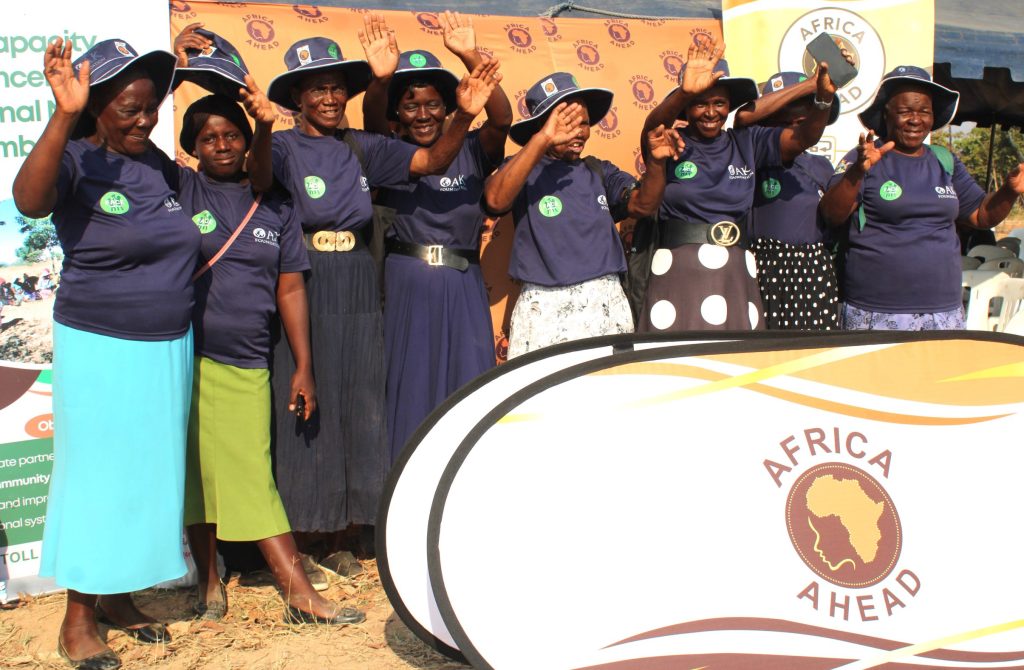By Maxine Kundishora
On Friday, the 27th of September 2024, FACE Zimbabwe, an implementing partner of the OAK Foundation-funded project led by Africa AHEAD, hosted a heartwarming graduation ceremony in honor of the successful Community Health Club (CHC) members. Held in Ward 19 of Makoni District, Zimbabwe, the event brought together diverse district stakeholders, including representatives from the Ministry of Health and Child Care, the District Development Coordinator (DDC), Rural District Council, local leaders and the wider community. The atmosphere was filled with joy and celebration as attendees witnessed firsthand the impact of community empowerment in promoting health and hygiene.
Some of the attendees who graced the ceremony included Mambo Makoni, Ishe Pasipamire, DDC Mr. Chirombe, DEHO Mrs. Chiwandire, DWSSC Chair Madam Bambo, Ward 19 Councilor Mr. Mangwiro, RDC Mr. Mupikata, Ward Coordinator Mr. Chinyama, various village heads and representatives from the gender, youth and women affairs units, as well as staff from Sangano Clinic. The event was facilitated by the master of ceremonies, Mr. Nyamunda, who followed the program closely, ensuring that all key moments were highlighted effectively.
The ceremony, held at Sangano Clinic in Ward 19 of Makoni district, marked the closing chapter of the project, whose core objective was to enhance the capacity of national NGOs through the Community Health Club (CHC) methodology. The Oak Foundation-funded project, through Africa AHEAD, also capacitated two other NGO’s (Kubatana Organisation and Simukai Child Protection Programme) in addition to FACE Zimbabwe. Kubatana celebrated the graduation of 429 members on the 19th of September where the Mutasa district DWSSC Chair Mr. Nyahoda termed it ”a top notch ceremony”, while Simukai is gearing up for its own momentous graduation event, set to take place in October 2024.
A total of 9 Community Health Clubs (CHCs), comprising 282 members (260 female and 22 male), led by 9 Community-Based Facilitators, graduated after completing a six-month training course. Over the course of 22 enriching sessions, these dedicated members were equipped with vital knowledge on critical health issues, from disease prevention for malaria, bilharzia and cholera to essential topics like sanitation and menstrual hygiene. The training program was structured around the in-depth toolkits crafted by Dr. Juliet Waterkeyn, who pioneered the CHC model.
After months of commitment and hard work, the moment had finally arrived when their efforts were recognized, each member proudly receiving their certificate. This graduation marked not just the completion of a training program, but a significant step towards healthier and more empowered communities.
Each Community Based Facilitator, also known as a Village Health Worker (VHW), proudly received certificates on behalf of themselves and their club members. They were also awarded hygiene-promoting prizes such as buckets, which sparked joy among the achievers. Ululations filled the air as graduates shook hands with dignitaries and posed for pictures, capturing the celebratory moment.
The graduating clubs, each uniquely named by their members, had representation of both male (M) and female (F) participants. These clubs included: Tanaka – 17 members (1M 17F), Mhakwe – 40 members (3M 37F), Maoresa – 52 members (4M 48F), Budiriro – 25 members (1M 24F), Batanai – 20 members (20F), Chenesai – 29 members (4M 25F), Utsanana – 26 members (2M 24F), Shasha – 45 members (1M 44F), Yemurai – 27 members (5M 27F) and Tanaka – 17 members (1M 16F).
The CHC methodology was evidently a catalyst for community development in Ward 19, with the community members showing much interest in the proceedings and teachings from the ceremony. Many non-members from the community attended the event and left impressed by the success of the graduates and inspired to join future CHCs.
While addressing the audience, the District Environmental Health Officer, Mrs. Chiwandire said “new clubs are expected to be formed, offering opportunities for those who were not part of the graduating group.” With the exceptional community collaboration, it is possible to meet hygiene targets for all in Ward 19 of Makoni District in the near future.
The ceremony was a resounding success, even drawing members from religious sects that traditionally do not follow mainstream health norms, proving a positive change in behaviour of the hard-to-reach communities.
A standout feature of the event was the diversity among club members. Both youth and senior members, including an 86-year-old, participated in the health clubs. Though youth participation was relatively low, they were strongly encouraged to join the new clubs that will be formed after the project’s conclusion, ensuring their involvement in community health initiatives. The inclusion of people living with disabilities and a number of males from the community in participatory health and hygiene practices, was also a highlight of the project.
A key takeaway for many was the powerful role that visual arts can play in fostering understanding of health and hygiene concepts, leading to behavioral change. Edutainment from the clubs, including drama, poems and songs, entertained the crowd while delivering important lessons from the training sessions. The slogan song was “Zvazara Zvose Zvamakataura” a Shona song meaning “everything you said has been fulfilled.” This served as an acknowledgment that all the trainings did not go to waste, but instead, the community is reaping fruitful results.
The creativity of the CHC members was further demonstrated in their hand crafted models of hygiene-enabling facilities, such as tippy taps (locally known as ‘chigubhugiya‘), two tier pot racks, refuse pits and sanitation facilities, which they have also installed in their households as lasting reminders for future generations.
While capacity building was a central focus, the success of the project was deeply rooted in the strong coordination and common unity ‘ubuntu/hunhu’ that filled the community. Overall, the graduation ceremony was a success, which showcased not only the power of the CHC methodology but also the spirit of togetherness and hope for continued progress in Ward 19 and beyond.
As the event concluded, it truly reflected the essence of the Community Health Club methodology in fostering sustainable community development.

